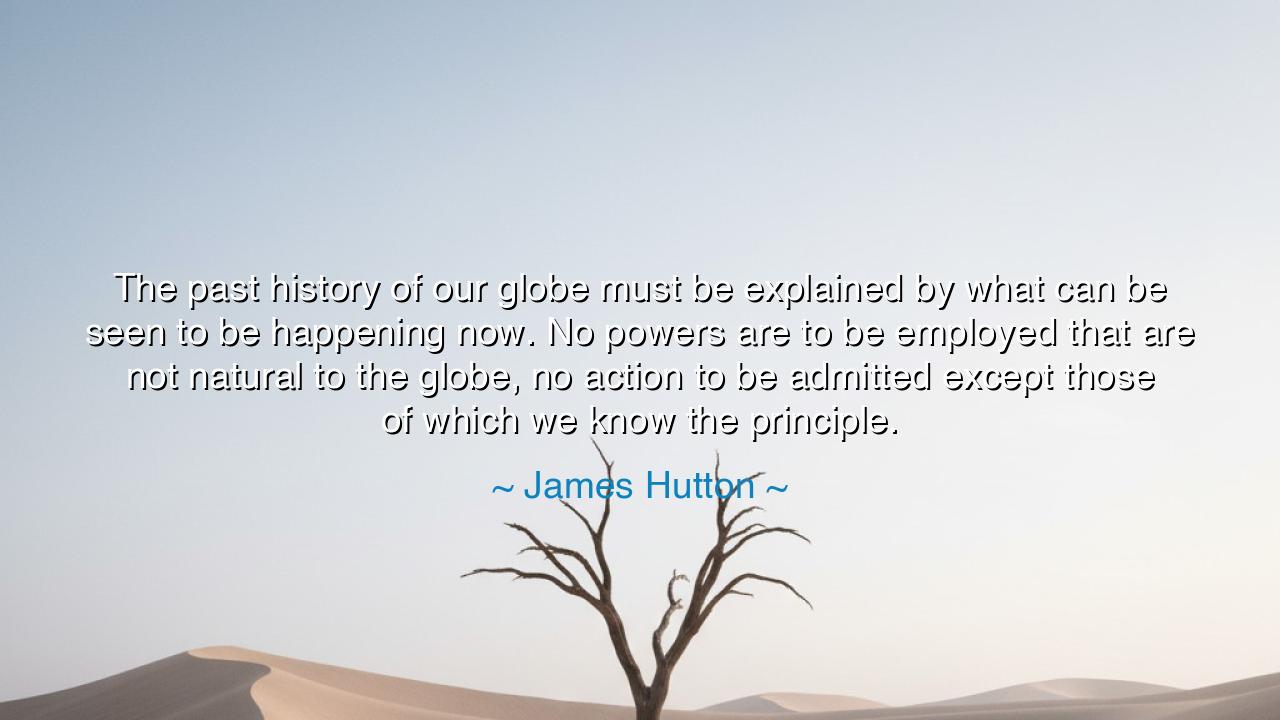
The past history of our globe must be explained by what can be
The past history of our globe must be explained by what can be seen to be happening now. No powers are to be employed that are not natural to the globe, no action to be admitted except those of which we know the principle.






When James Hutton, the father of modern geology, declared, “The past history of our globe must be explained by what can be seen to be happening now. No powers are to be employed that are not natural to the globe, no action to be admitted except those of which we know the principle,” he spoke with the voice of a prophet of science. His words, though born in the eighteenth century, still echo through the ages, for they reveal a truth that transcends the study of stone and soil — that the present holds the key to the past, and that knowledge must be rooted in what can be observed, tested, and understood. In an era when men explained the world through myth and miracle, Hutton lifted the veil of superstition and replaced it with reason, patience, and the eternal rhythm of nature.
Hutton lived in a time when most believed the Earth was young — a few thousand years old, shaped by sudden cataclysms and divine intervention. But as he wandered the hills of Scotland, he saw with his own eyes the slow grinding of rivers, the gentle layering of sediments, and the mighty uplift of mountains. From those quiet observations, he conceived a vision that changed humanity’s understanding of time itself. He realized that the forces shaping the land now — wind, water, fire, and the ceaseless decay and renewal of matter — were the same forces that had shaped it for eons beyond human reckoning. In his insight, miracle gave way to process, and the Earth became not a fleeting stage, but a vast and ancient being, ever changing, yet eternal in motion.
The meaning of his quote lies in the triumph of natural law over mythic fancy. When Hutton says that “no powers are to be employed that are not natural to the globe,” he rejects the notion that the past was governed by forces unknown to the present. He proclaims that the Earth, and by extension all of creation, is consistent and rational — that the same principles that cause a stream to carve its bed today have sculpted valleys, continents, and oceans since time immemorial. This is not merely a geological insight; it is a philosophy of truth — a belief that understanding must rest upon evidence, not imagination.
Consider the revolutionary weight of this idea. Before Hutton, men explained fossils as curiosities of chance or remnants of a global flood. But Hutton saw in them the handwriting of eternity — the story of life and death repeated endlessly upon the surface of the globe. His discovery laid the foundation for Charles Lyell’s Principles of Geology and inspired Charles Darwin to see evolution as a slow unfolding, not a sudden creation. Thus, from the patient study of rocks came not only geology, but the modern vision of life itself — a vision built upon the continuity of natural law.
The ancients, too, glimpsed this truth in fragments. Heraclitus spoke of a world “ever-living, kindled and quenched by measure,” and Aristotle sought causes within nature rather than beyond it. But Hutton gave form to what they only sensed: that the universe is self-governing, lawful, and enduring, that we need not summon gods or monsters to explain the mountains or the seas. In his philosophy, the divine is not cast out, but transformed — no longer the hand that interrupts nature, but the wisdom that sustains it. His doctrine was not one of disbelief, but of reverence through understanding.
There is also a deeper, almost spiritual wisdom hidden in his words. Hutton teaches that in all things — not just in the Earth, but in human life — the present is the key to the past. We cannot rewrite history through fantasy; we must read it through what we see and know today. The truths of the human heart, like those of the soil, are revealed through continuity. The forces that shape character — effort, patience, failure, renewal — are the same that shape civilizations and worlds. As in geology, so in life: nothing is made in haste; all things endure through process and time.
So, O seeker of wisdom, take this lesson from Hutton’s immortal words: seek truth in what is real, not in what is wished for. Observe, learn, and let the steady laws of nature and reason guide your understanding. For whether you study rocks, people, or the course of destiny, you will find that the same forces that move now have always moved — slowly, invisibly, but inexorably shaping the world. Let your faith, then, rest not in mystery but in order, not in fleeting signs but in enduring causes. And like Hutton, when you behold the grandeur of creation, you too may whisper his final revelation: “We find no vestige of a beginning, no prospect of an end.”






AAdministratorAdministrator
Welcome, honored guests. Please leave a comment, we will respond soon